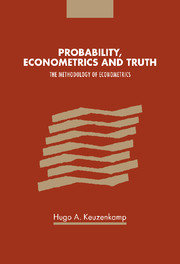Book contents
- Frontmatter
- Contents
- Introduction
- 1 The philosophy of induction
- 2 Probability and indifference
- Intermezzo: a formal scheme of reference
- 3 Relative frequency and induction
- 4 Probability and belief
- 5 The theory of simplicity
- 6 From probability to econometrics
- 7 Econometric modelling
- 8 In search of homogeneity
- 9 Positivism and the aims of econometrics
- 10 Probability, econometrics and truth
- Personalia
- References
- Name Index
- Subject Index
7 - Econometric modelling
Published online by Cambridge University Press: 22 September 2009
- Frontmatter
- Contents
- Introduction
- 1 The philosophy of induction
- 2 Probability and indifference
- Intermezzo: a formal scheme of reference
- 3 Relative frequency and induction
- 4 Probability and belief
- 5 The theory of simplicity
- 6 From probability to econometrics
- 7 Econometric modelling
- 8 In search of homogeneity
- 9 Positivism and the aims of econometrics
- 10 Probability, econometrics and truth
- Personalia
- References
- Name Index
- Subject Index
Summary
It takes a lot of self-discipline not to exaggerate the probabilities you would have attached to hypotheses before they were suggested to you.
L. J. Savage (1962)Introduction
The frequency interpretation of probability presumes that the statistical model is given by underlying theory, or by experimental design (the ‘logic of the laboratory’). The task of the statistician is to estimate the parameters and to test hypotheses.
Econometrics is different. The underlying economic theories to justify a model are not well established. Hence, part of the inference concerns the theory and specification of the model. The usually unique, nonexperimental data (sample) are used for specification purposes, the specification thus derived is used for the purpose of inference. There is no experimental design to justify distributional assumptions: if they are investigated, the same data are used for this purpose. The pioneer of econometrics, Tinbergen (1939b, p. 6), had already recognized that it is not possible to work with a sequence of two separate analytical stages, ‘first, an analysis of theories, and secondly, a statistical testing of those theories’. Modelling turned out to become an Achilles' heel for econometrics.
Moreover, one task of inference is theoretical progress, hence, the search for new specifications. The probability approach, advocated by Haavelmo and his colleagues at the Cowles Commission, is not suitable for inference on rival theories and specifications in a situation of unique, non-experimental data.
- Type
- Chapter
- Information
- Probability, Econometrics and TruthThe Methodology of Econometrics, pp. 142 - 179Publisher: Cambridge University PressPrint publication year: 2000



